Ultimate Guide to the Best Small Backup Generators
A small backup generator is the most efficient way of having electricity, whether facing a power outage or enjoying a camping trip. Imagine a stormy night when the power goes out; a small generator can turn worry into life without interruption. This guide talks about these little powerhouses and their importance to our lives.
Jackery has been a leader in small solar generator production with compact options that are both new and reliable. We'll talk about why small backup generators are essential, how they work, and how brilliant they are.
|
Products |
Image |
Capacity |
Rated / Peak Power |
Battery |
Size |
|
|
1265Wh |
2000W/4000W |
Li-Fe PO4 |
Length= 14in Width= 10.28in Height= 11.14in |
|
|
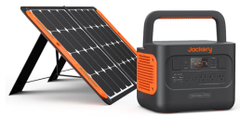 |
680Wh |
8.34A/1000W |
Li-Fe PO4 |
Length= 13.4in Width= 10.3in Height= 10in |
|
|
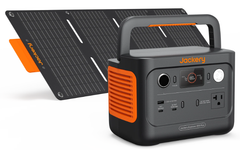 |
288Wh |
300W/600W |
Li-Fe PO4 |
Length= 9.1in Width= 6.1in Height= 6.6in |
What is a Small Backup Generator?
A small backup generator provides energy in emergencies or when regular power sources are unavailable. These generators are smaller than industrial or standby generators, making them portable and suited for residences, outdoor activities, and small businesses. With them, you have a backup source of dependable electricity during unexpected outages or off-grid situations. Some reasons for their importance:
Emergency preparedness:
Small backup generators keep essential appliances and electronics running during storms, natural catastrophes, and grid disruptions. They can keep medical equipment, freezers, communication devices, and lights working during crises, improving safety and comfort. Small generators' mobility and compact size make them ideal for many applications. Their portability provides electricity wherever needed for camping, outdoor events, construction sites, and domestic backups.
Business continuity:
Small backup generators can keep small enterprises running during power outages. They avoid data loss, sustain productivity, and keep essential equipment functioning, reducing downtime costs. Small generators power everyday activities, appliances, and electronics for off-grid enthusiasts or people in rural places without dependable power sources. In an increasingly electricity-dependent society, modest backup generators provide continuity, safety, and convenience during unexpected power outages, giving peace of mind.
How Much Does a Small Backup Generator Cost?
Small backup generator prices might vary greatly depending on brand, power output, fuel type, and features. Small backup generators cost $200 to $1,500 or more. Models with lesser power output are cheaper, whereas ones with more wattage and amenities like electric starters, numerous outlets, or inverter technology are more expensive.
Jackery's compact solar generators cost $300 for entry-level versions and $2000 or more for higher-capacity models, with features including enhanced battery capacity, numerous charging methods, and mobility. These costs vary by model, power output, battery capacity, and extras or kits. Here are some Jackery solar generators and their prices.
- Solar Generator 1000 Plus cost $1699
- Solar Generator 700 Plus cost $999
- Solar Generator 300 Plus cost $399.9
When comparing generator prices, value, durability, and features may greatly affect their power efficiency and lifetime.
What Small Backup Generator Is Best for You?
Portable generators are mobile and versatile. They are tiny, portable, and suitable for camping and outdoor activities, as well as emergency power for homes and small businesses.
Inverter Generators:
Quieter and more efficient inverter generators provide clean, reliable power for sensitive equipment. Their size and fuel efficiency are usually better than typical generators.
Standby Generators:
Smaller standby generators may power vital appliances or smaller areas during outages. They are normally permanently placed and activated when the main power fails.
Solar Generators:
Solar generators charge an integrated battery with solar energy, giving clean, sustainable electricity. They're portable, perfect for outdoor activities, and can power tiny devices and appliances.
Wind Turbines:
Small wind turbines can provide electricity when linked to batteries, although they are rare for small-scale backup. They work in continuous windy environments.
|
Types of Small Generators |
Pros |
Cons |
|
Gas Generator |
· Widely available fuel · Relatively affordable · Immediate power when needed |
· Can be noisy · Regular fuel storage · maintenance needed · Emissions |
|
Diesel Generator |
· Efficient fuel usage · Longer lifespan · Suitable for heavy-duty use |
· Noisier than propane or inverter generators · Emissions · Fuel availability may vary |
|
Propane Generator |
· Cleaner burning fuel · Longer shelf life of fuel · Quieter than gas or diesel generators |
· Fuel might require specialized storage · The initial cost of setup can be higher |
|
Solar Generator |
· Renewable energy source · Quiet operation · Low maintenance |
· Relies on sunlight for charging · Initial setup costs can be higher · Limited power output in certain conditions |
Installation:
Gas, diesel, and propane generators need a specific location, ventilation, and occasionally expert installation. Solar generators require sunshine to work well.
Fuel:
Gas and diesel generators need fuel. Propane generators use fuel more efficiently. Solar generators charge using sunshine.
Noise:
Propane and solar generators are quieter than gas and diesel generators.
Emissions:
Propane and solar generators emit less than gas and diesel generators.
Maintenance:
Gas and diesel generators need fuel storage, oil replacements and component checks. Most propane and solar generators need minimal maintenance.
Power:
Different generators have different power outputs and capacities. Therefore, it's important to match the generator's capacity to your power demands.
Given power needs, environmental concerns, and practicality, these variables will assist you in choosing the best small backup generator.
How Does a Small Backup Generator Work?
How a Backup Generator Works:
A backup generator converts mechanical energy into electricity. Simple process breakdown:
- In classic fuel-powered generators (gas or diesel), fuel is consumed in an internal combustion engine. Pistons rotate while fuel burns.
- An alternator, a wire coil and a magnet receive this rotating energy. Electromagnetic induction powers the wire coil while the engine rotates the alternator.
- The electrical current that is produced passes via a voltage regulator to guarantee a steady and constant voltage for gadgets and appliances.
- Outlets or transfer switches deliver power to appliances or a building's electrical system.
How Solar Generators Work:
A solar generator like the Jackery Solar Generator converts sunlight into energy using PV panels. Simplified method explanation:
- Solar panels use photovoltaic cells to convert sunlight into DC power.
- The produced DC current is sent to a charge controller, which controls charging to avoid overcharging and preserve battery health.
- An integrated battery or battery bank in the solar generator stores power. Energy-storing lithium-ion batteries are common.
- An inverter converts battery DC energy into AC electricity when required. Most home electronics require AC electricity.
- Built-in outlets, USB ports, and other appropriate connections power gadgets and appliances with converted AC energy.
Jackery Solar Generators:
The Jackery Solar Generator is a portable power station that combines solar panels, a charge controller, a lithium battery, and an inverter. This portable power source is clean and renewable. Solar panels provide solar energy, which is stored in a lithium battery and converted into AC power via an inverter. Jackery provides the best small home backup generators that charge and power electronics and appliances, making it ideal for outdoor activities, emergencies, and off-grid life.

Jackery Solar Generators: 3 Best Small Backup Generators
The Jackery Solar Generator is a portable power station with solar panels, a charge controller, a lithium battery, and an inverter. It captures solar energy, stores it effectively, and provides stable power for many purposes.
Why Backup with a Jackery Solar Generator:
Portable and convenient:
Travelling and setting up the Jackery Solar Generator is simple due to its lightweight and small design. This mobility gives you a backup power source for camping, road trips, and emergencies.
Clean and Renewable Energy:
The Jackery Solar Generator uses solar electricity instead of petrol, diesel or propane. It is eco-friendly and fuel-free, decreasing your carbon impact.
Emergency Preparedness:
A Jackery Solar Generator provides backup power during power outages. It can power lights, communication devices, medical equipment, and small appliances without grid power. Traditional generators are noisy and need more maintenance than solar generators. Noise and maintenance are reduced by no moving components or fuel combustion. That is why any Jackery product is the best small backup generator for home use.
Versatile Power Source:
The Jackery Solar Generator has AC, USB, and DC output connections to charge and power cellphones, laptops, small appliances, and camping gear. Jackery Solar Generator delivers reliable electricity for off-grid living or distant regions without standard power sources, enabling you to preserve comfort and functioning.
In conclusion, the Jackery Solar Generator is a versatile, eco-friendly, and dependable backup power source for emergencies, outdoor excursions, and daily living.
Jackery Solar Generator Working Hours:
To figure out how many hours Jackery Explorer works, think about the following factors:
Battery size in watt-hours:
The most common way to measure how much energy a power plant can produce is by using Watt-hours. It's possible for a 1000Wh power station to run a 100W device for 8.5 hours.
Loss of Efficiency:
The inverter and other parts lose energy. On average, 85 to 90% of models are efficient. This formula can help you figure out how many hours your power station will work if you know the battery size, the wattage of the device you want to run, and the efficiency loss percentage:
Working Hours = (Battery Capacity in WH) × 0.85 / (Device Power Consumption in W)
Jackery Solar Generator 1000 Plus:
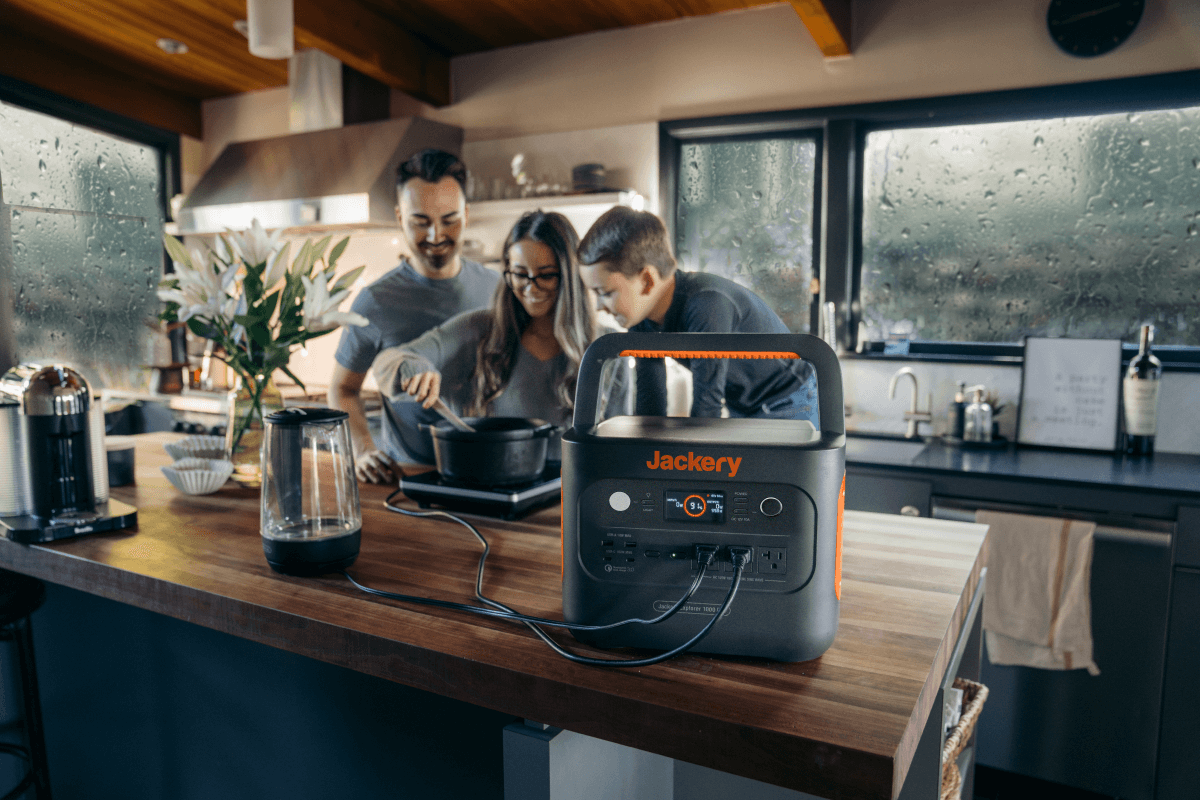
The Jackery Solar Generator 1000 Plus has a bigger energy storage capacity than its predecessors. Strong lithium-ion battery stores solar electricity effectively. Its bigger capacity makes it larger than the 700 Plus and 300 Plus variants. The lithium-ion batteries last a long time. Charges by solar panels, AC wall outlet, or carport. Features: AC, USB, and DC output connections for diverse device charging.
|
Product |
Solar Generator 1000 Plus |
|
Capacity |
1265Wh |
|
Battery Cell |
Li-Fe PO4 |
|
Dimension |
Height 11.4 in, Length 14 in, Width 10 in |
|
Life Cycle |
4000 charge and discharge cycles |
|
Recharging Methods |
You can recharge it via an AC wall outlet, a 12V car outlet, or solar panels (solar panels and accessories are sold separately). |
|
Output Ports |
AC Output(x3), USB-A Output(x2), USB-C Output(x2) |
Jackery Solar Generator 700 Plus:

It offers a moderate capacity and is ideal for backup powering important electronics and small appliances. Its ratings and peak power are adequate for modest power demands. With the Energy-efficient lithium-ion battery compact and compact, combining capacity and mobility, it is one of the best small backup generators. Lithium-ion batteries last long, and like the 1000 Plus, you can charge these with solar panels, AC wall sockets, or a carport. Power shortages and outdoor activities are easier with several output connectors for charging electronics.
|
Product |
Solar Generator 700 Plus |
|
Capacity |
680Wh |
|
Battery Cell |
Li-Fe PO4 |
|
Dimension |
Length 13.4 in , Width 10.3 in, Height 10.0 in |
|
Life Cycle |
4000 cycles to 70%+ capacity |
|
Recharging Methods |
Solar panels, AC outlet, car charger |
|
Output Ports |
AC Output(x3), USB-A Output(x2), USB-C Output(x2) |
Jackery Solar Generator 300 Plus:
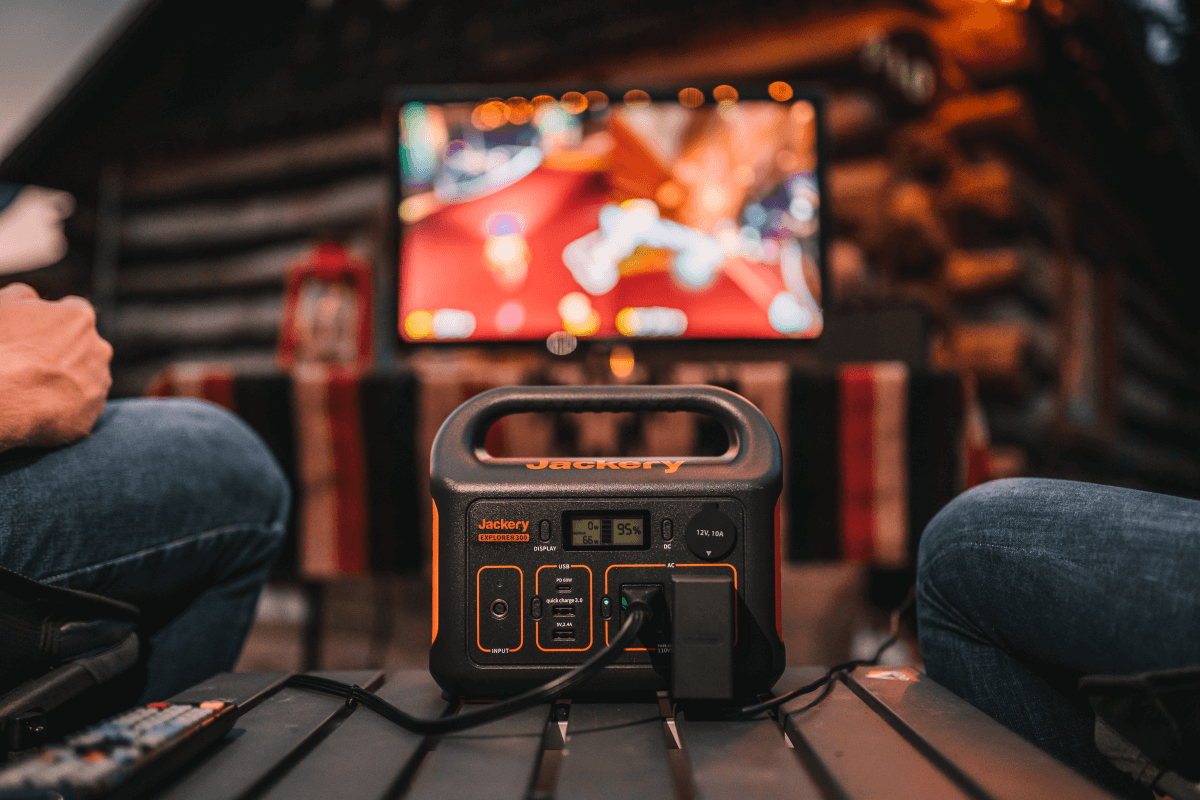
Its small capacity is ideal for charging smaller gadgets and operating minimum appliances. It offers lower yet functioning rated and peak power. A lithium-ion battery stores energy efficiently. With appropriate maintenance, lithium-ion batteries last long. Similar to previous versions, charges by solar panels, AC wall outlet, or carport.
|
Product |
Solar Generator 300 Plus |
|
Capacity |
288Wh |
|
Battery Cell |
Li-Fe PO4 |
|
Dimension |
Length 9.1 in, Width 6.6 in, Height 6.1 in. |
|
Life Cycle |
4000 cycles |
|
Recharging Methods |
Solar panels, AC outlet, car charger |
|
Output Ports |
AC Output(x1), USB-A Output(x1), USB-C Output(x1), USB-C Output(x2) |
How Big Of a Solar Generator Do You Need?
- List essential appliances and devices: Select appliances and gadgets to power during an outage. Include essentials like fridges, lighting, HVAC systems, and medical equipment.
- Find power ratings (watts) for each appliance or item on your list. This information is generally on the product label or user handbook.
- Add all device wattages to get the total power required during an outage.
- Consider Starting and Running Watts: Some devices have a greater starting wattage than running watts. Generators must handle both. Ensure your generator can withstand appliance starting surges.
- Include a safety buffer or allow for future gadgets you may wish to power.
- Choose the Right Generator Size: Based on the total wattage determined, choose a generator with a capacity that surpasses your power demands to assure comfort.
|
Item |
Power |
|
· Window air conditioner · Aquarium · Ceiling fan · Coffee maker · Desktop computer · Dryer · Laptop · Well pump · Water heater · Washing machine · Vacuum cleaner · Toaster oven · Television (42-inch) · Tablet · Sump pump · Refrigerator · Portable heater · Microwave |
400-1,200 watts 50-1,200 watts 65-175 watts 600-1.200 watts 125-200 watts Z000-6,000 watts 20-75 watts 750-1,000 watts 4.000-5,000 watts 500-1,200 watts 300-1,500 watts 1,000-1,200 watts 200-300 watts 10-20 watts 800-1,000 watts 500-1,000 watts 750-1,500 watts 700-1,500 watts
|
How to Choose the Best Small Backup Generator
Several considerations should affect your small backup generator choice to guarantee it meets your demands and conditions. Consider these critical factors:
- Power Capacity
- Fuel and Efficiency
- Portability
- Durability and Build Quality
- Operating noise
- Maintenance
- Additional Features.
Final Thoughts
Let’s conclude our guide to the best small backup generators. Whether you live in an apartment or a house, you need a backup generator in case of power outages and emergencies. With it, you can power your home appliances and electric devices without worrying about anything. It is also your best partner when you go on camping trips.
Disclaimer:
The runtime mentioned for appliances powered by Jackery is for reference only. Actual runtime may vary under different conditions. Please refer to real-world performance for accurate results.

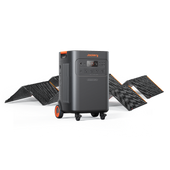


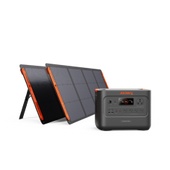







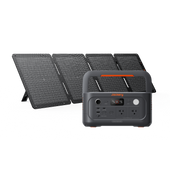





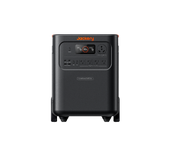
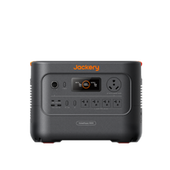




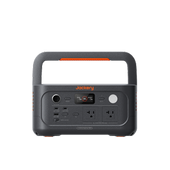





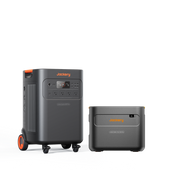
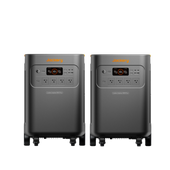
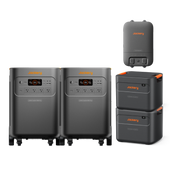





![[Add - on] Jackery Manual Transfer Switch for Explorer 5000 Plus - Jackery](http://www.jackery.com/cdn/shop/files/add-on-jackery-manual-transfer-switch-for-explorer-5000-plus-9017324.png?v=1754016782&width=170)

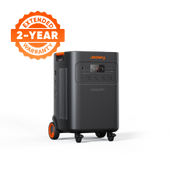
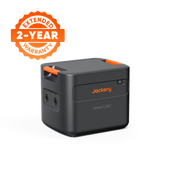
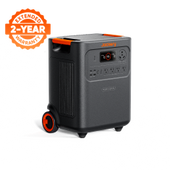
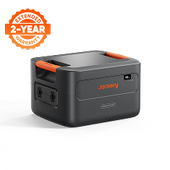
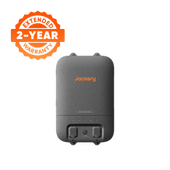



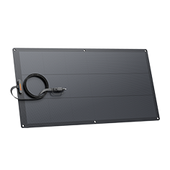
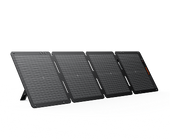



















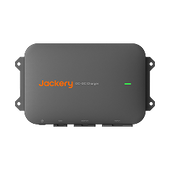




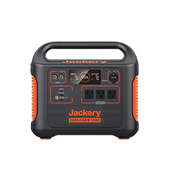







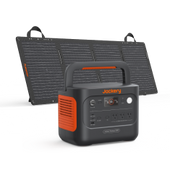
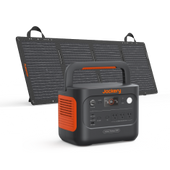




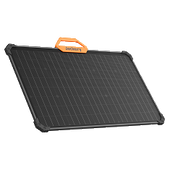
















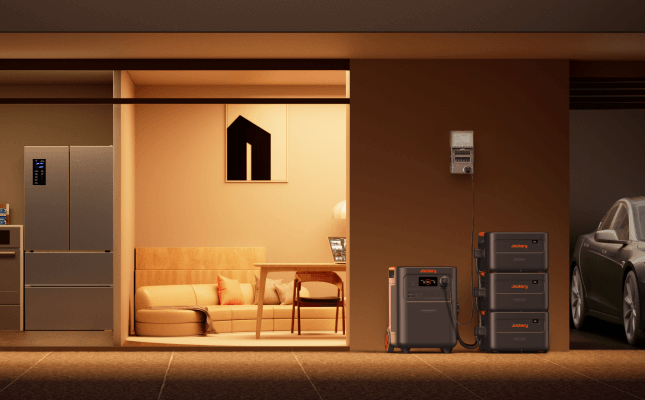


















Leave a comment